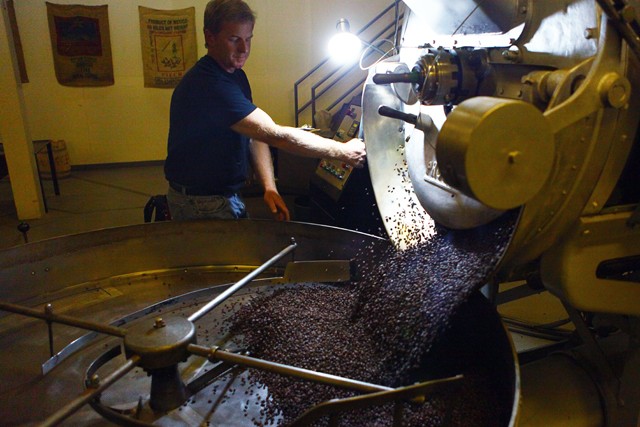Working more than 100 hours a week and sometimes until 3 a.m., Kyle Meehan said he didnâÄôt last long in investment banking.
After graduating with a dual degree in finance and entrepreneurship in 2008 from the Carlson School of Management, Meehan said he knew he had pursued a career using the wrong major.
“I hated it, so I left,” Meehan said.
Acting on his entrepreneurial instincts, Meehan began working with Tiny Footprint Coffee, which bills its product as the worldâÄôs first carbon negative coffee.
Now heâÄôs trying to get the coffee into the University Dining Services at the University of Minnesota.
“The entrepreneurial spirit is really what has been inside of me for a long time,” Meehan said. “I love every single day here.”
Acting as the project manager for Tiny Footprint, Meehan said it is his duty to spearhead the Tiny Footprint movement and start getting the brand recognized.
Less than one year ago, a pair of brothers founded Tiny Footprint with the mission to help reforest the Mindo Cloudforest in Ecuador through a process of mitigating their carbon footprint.
The company did an analysis of its production and found that it took just under four pounds of carbon to have their coffee grown, shipped, roasted and delivered, co-founder Alan Krohnke said.
To offset the emitted carbon, Tiny Footprint decided to buy 54 pounds of carbon negative offsets per pound of coffee it produces.
The offsets, essentially donated to Mindo Cloudforest Foundation, go toward reforestation efforts, reinstating habitats and creating jobs for people in Ecuador.
Within the past month, Krohnke said his company, Roastery 7, produced almost 2,000 pounds of Tiny Footprint Coffee.
According to the Mindo CloudforestâÄôs website, it costs $9.49 per 2,000 pounds to offset the carbon emitted.
Krohnke said the Mindo Cloudforest FoundationâÄôs prices fluctuate and can be more expensive based on the cost of reforestation, but at this rate Tiny Footprint would have to spend around $480 this month on offsets.
Contracting with the University
Meehan said one of his goals is to expand Tiny FootprintâÄôs presence on college campuses, including at the University.
“WeâÄôve identified colleges as a market we think our product fits into,” Meehan said. “I was in college two years ago and I would have loved to have seen a product like this on campus.”
Leslie Bowman, director of University Dining Services Contract Administration, who has been in contact with Meehan, said in an e-mail that the University isnâÄôt considering new contracts for its coffee lineup right now.
However, once there are new opportunities open, Tiny Footprint will be considered, Bowman said.
“When we open a new venue, we consider whether our constituents are asking for a branded venue or whether the constituents in that area are more interested in fair trade,” Bowman said.
Citing student surveys, Bowman said students have chosen Starbucks âÄî which has stands in both Coffman Union and Hanson Hall âÄî as their preferred brand.
Besides Starbucks, the University also has contacts with Dunn Bros. and CityKid Java.
“ItâÄôs tough to break into that, but IâÄôm not going to quit,” Meehan said of Tiny FootprintâÄôs chances. “I think if the students hear about it and are wondering, âÄòwhy wouldnâÄôt we have it on campus?âÄô I think thatâÄôs going to be a lot more powerful than us trying to get in.”
Amy Short, sustainability coordinator at the University, said she felt Tiny Footprint would fit in well around campus.
“I do think that their business has a really unique and important approach as far as working toward being a more sustainable company and providing a more sustainable product,” Short said. “[ItâÄôs] really in sync with the goals that weâÄôre trying to implement at the University and our sustainability efforts.”
How Tiny Footprint Does Coffee
In addition to its commitment to deforestation, Tiny Footprint also supports a new coffee growersâÄô group in Ecuador.
Tiny Footprint currently gets its coffee from all the major coffee-producing areas such as Ethiopia, Columbia and Costa Rica. Eventually, the brand would like to get more of its coffee from the Mindo Cloudforest area, Krohnke said.
The companyâÄôs contributions to Mindo Cloudforest helped plant shade trees in old cattle pastures and then add coffee plants after the ground was fertile enough.
Krohnke said the group was excited to have coffee from the same area but that it will take three to five years before the farm would be able to produce enough beans to export.
During the 1960s and 1970s, the Ecuadorian government encouraged deforestation to create cattle pastures to increase the countryâÄôs GDP, Krohnke said.
“But the land gets depleted and the cattle doesnâÄôt grow very hearty,” Krohnke said. “So it never worked. It destroyed a whole ecosystem.”

















